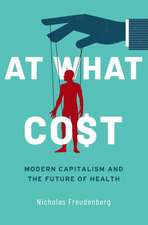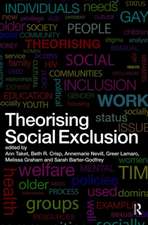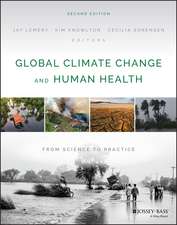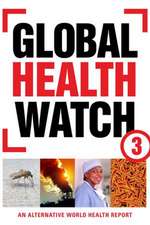Epidemics and Society: From the Black Death to the Present: The Open Yale Courses Series
Autor Frank M. Snowdenen Limba Engleză Paperback – 23 apr 2020
A “brilliant and sobering” (Paul Kennedy, Wall Street Journal) look at the history and human costs of pandemic outbreaks
As seen on “60 Minutes”
The World Economic Forum #1 book to read for context on the coronavirus outbreak
This sweeping exploration of the impact of epidemic diseases looks at how mass infectious outbreaks have shaped society, from the Black Death to today, and in a new preface addresses the global threat of COVID-19. In a clear and accessible style, Frank M. Snowden reveals the ways that diseases have not only influenced medical science and public health, but also transformed the arts, religion, intellectual history, and warfare.
A multidisciplinary and comparative investigation of the medical and social history of the major epidemics, this volume touches on themes such as the evolution of medical therapy, plague literature, poverty, the environment, and mass hysteria. In addition to providing historical perspective on diseases such as smallpox, cholera, and tuberculosis, Snowden examines the fallout from recent epidemics such as HIV/AIDS, SARS, and Ebola and the question of the world’s preparedness for the next generation of diseases.
As seen on “60 Minutes”
The World Economic Forum #1 book to read for context on the coronavirus outbreak
This sweeping exploration of the impact of epidemic diseases looks at how mass infectious outbreaks have shaped society, from the Black Death to today, and in a new preface addresses the global threat of COVID-19. In a clear and accessible style, Frank M. Snowden reveals the ways that diseases have not only influenced medical science and public health, but also transformed the arts, religion, intellectual history, and warfare.
A multidisciplinary and comparative investigation of the medical and social history of the major epidemics, this volume touches on themes such as the evolution of medical therapy, plague literature, poverty, the environment, and mass hysteria. In addition to providing historical perspective on diseases such as smallpox, cholera, and tuberculosis, Snowden examines the fallout from recent epidemics such as HIV/AIDS, SARS, and Ebola and the question of the world’s preparedness for the next generation of diseases.
Preț: 131.19 lei
Preț vechi: 138.10 lei
-5% Nou
Puncte Express: 197
Preț estimativ în valută:
25.10€ • 26.84$ • 20.93£
25.10€ • 26.84$ • 20.93£
Carte disponibilă
Livrare economică 28 martie-11 aprilie
Livrare express 13-19 martie pentru 42.15 lei
Preluare comenzi: 021 569.72.76
Specificații
ISBN-13: 9780300256390
ISBN-10: 0300256396
Pagini: 608
Ilustrații: 40 b-w illus.
Dimensiuni: 156 x 235 x 45 mm
Greutate: 0.74 kg
Editura: Yale University Press
Colecția Yale University Press
Seria The Open Yale Courses Series
ISBN-10: 0300256396
Pagini: 608
Ilustrații: 40 b-w illus.
Dimensiuni: 156 x 235 x 45 mm
Greutate: 0.74 kg
Editura: Yale University Press
Colecția Yale University Press
Seria The Open Yale Courses Series
Recenzii
“Brilliant and sobering.”—Paul Kennedy, Wall Street Journal
"Snowden . . . examines the ways in which disease outbreaks have shaped politics, crushed revolutions, and entrenched racial and economic discrimination. . . . Gigantic in scope, stretching across centuries and continents, Snowden’s account seeks to explain, too, the ways in which social structures have allowed diseases to flourish."—Isaac Chotiner, New Yorker
“[A] necessary and persuasive book…In an updated introduction to his book, Snowden traces a comparable arrogance in our own leaders, who have allowed global inequalities to foster the illusion that infectious diseases, old and new, are a thing of the past.”—Tim Adams, The Guardian
"Frank Snowden’s book presents a comprehensive historical perspective on societies' vulnerabilities to pandemics. The author presents these not as random events but rather endogenous: "Every society produces its own specific vulnerabilities". Pandemics help us understand societies' structures and their political priorities. A well-written, highly entertaining and relevant book."—Milton Hayek, Financial Times ‘Readers' Best Books’
“[A] wide-ranging study”—Laura Spinney, Nature
"Covering roughly a millennium on about 550 pages is no small task…very readable"—Christoph Gradmann, The Lancet
"Illuminating and instructive, jam-packed with fascinating details. . . . A splendid—and scary—account of a potent and still-present threat to humankind."—Glenn Altschuler, Florida Courier
"A very useful, wide-ranging review of the multiple connections between epidemic disease and historical change and development. . . . A very readable book. Highly recommended. All readers."—Choice
#1 of "5 Books to Read for Context on the Coronavirus Outbreak"—World Economic Forum
"Encyclopedic in scope, comprehensive in coverage, and highly readable, [the book] provides a kind of course of study for anyone curious to learn more about the general subject."—Peter I. Rose, Society
"Essential reading for anyone who is concerned about society’s preparedness to meet new microbial challenges and who appreciates the importance of history to develop effective and efficient responses."—Socrates Litsios, author of The Tomorrow of Malaria
“A superb synthesis of a complex and important topic. Snowden brings to the subject a wealth of previous research on disease and brilliantly integrates his work into more general historical concerns. A major achievement.”—William Bynum, author of A Little History of Science
"Professor Snowden provides an authoritative and very readable historical account of several of the major the major infectious diseases epidemics that have afflicted mankind with a focus on their impact on society."—Brian Greenwood, London School of Hygiene & Tropical Medicine
"In an era of rapidly emerging diseases, Epidemics and Society reminds us that in framing epidemics we are also, always, refiguring human life and fate in relation to ecology and society."—Warwick Anderson, author of Colonial Pathologies: American Tropical Medicine, Race, and Hygiene in the Philippines
“A distinctive and very useful contribution to the public understanding of disease."—Mark Harrison, author of Contagion: How Commerce Has Spread Disease and Director, Wellcome Unit for the History of Medicine
"Snowden . . . examines the ways in which disease outbreaks have shaped politics, crushed revolutions, and entrenched racial and economic discrimination. . . . Gigantic in scope, stretching across centuries and continents, Snowden’s account seeks to explain, too, the ways in which social structures have allowed diseases to flourish."—Isaac Chotiner, New Yorker
“[A] necessary and persuasive book…In an updated introduction to his book, Snowden traces a comparable arrogance in our own leaders, who have allowed global inequalities to foster the illusion that infectious diseases, old and new, are a thing of the past.”—Tim Adams, The Guardian
"Frank Snowden’s book presents a comprehensive historical perspective on societies' vulnerabilities to pandemics. The author presents these not as random events but rather endogenous: "Every society produces its own specific vulnerabilities". Pandemics help us understand societies' structures and their political priorities. A well-written, highly entertaining and relevant book."—Milton Hayek, Financial Times ‘Readers' Best Books’
“[A] wide-ranging study”—Laura Spinney, Nature
"Covering roughly a millennium on about 550 pages is no small task…very readable"—Christoph Gradmann, The Lancet
"Illuminating and instructive, jam-packed with fascinating details. . . . A splendid—and scary—account of a potent and still-present threat to humankind."—Glenn Altschuler, Florida Courier
"A very useful, wide-ranging review of the multiple connections between epidemic disease and historical change and development. . . . A very readable book. Highly recommended. All readers."—Choice
#1 of "5 Books to Read for Context on the Coronavirus Outbreak"—World Economic Forum
"Encyclopedic in scope, comprehensive in coverage, and highly readable, [the book] provides a kind of course of study for anyone curious to learn more about the general subject."—Peter I. Rose, Society
"Essential reading for anyone who is concerned about society’s preparedness to meet new microbial challenges and who appreciates the importance of history to develop effective and efficient responses."—Socrates Litsios, author of The Tomorrow of Malaria
“A superb synthesis of a complex and important topic. Snowden brings to the subject a wealth of previous research on disease and brilliantly integrates his work into more general historical concerns. A major achievement.”—William Bynum, author of A Little History of Science
"Professor Snowden provides an authoritative and very readable historical account of several of the major the major infectious diseases epidemics that have afflicted mankind with a focus on their impact on society."—Brian Greenwood, London School of Hygiene & Tropical Medicine
"In an era of rapidly emerging diseases, Epidemics and Society reminds us that in framing epidemics we are also, always, refiguring human life and fate in relation to ecology and society."—Warwick Anderson, author of Colonial Pathologies: American Tropical Medicine, Race, and Hygiene in the Philippines
“A distinctive and very useful contribution to the public understanding of disease."—Mark Harrison, author of Contagion: How Commerce Has Spread Disease and Director, Wellcome Unit for the History of Medicine
Notă biografică
Frank M. Snowden is Andrew Downey Orrick Professor Emeritus of History and History of Medicine at Yale University. His previous books include The Conquest of Malaria: Italy, 1900–1962 and Naples in the Time of Cholera, 1884–1911.
























